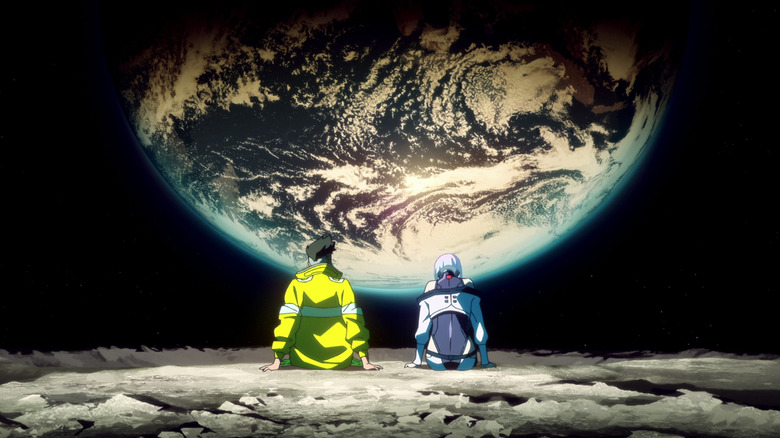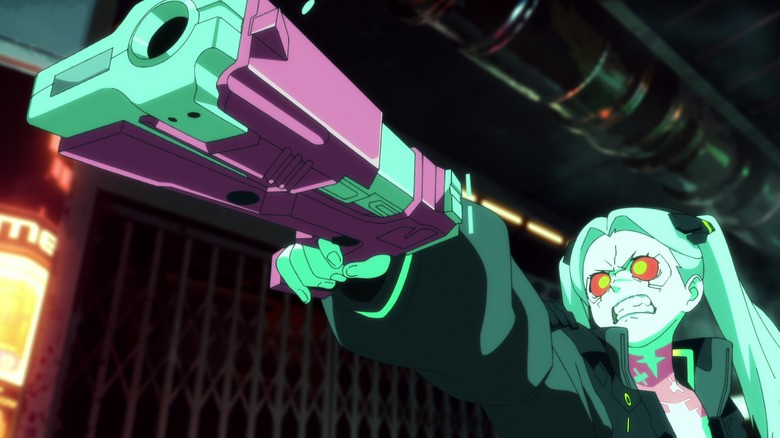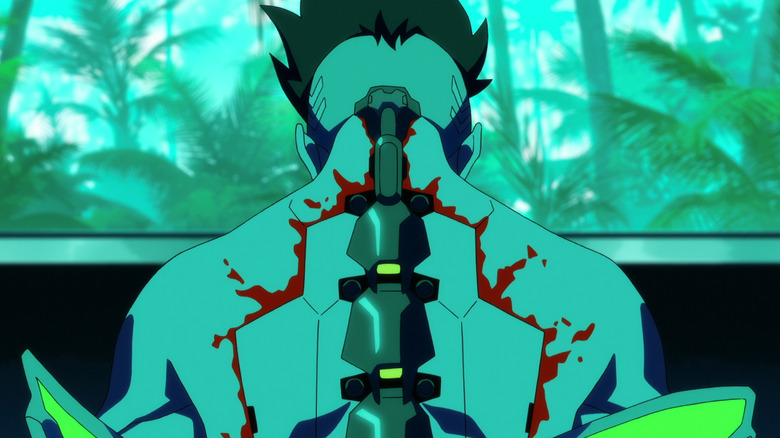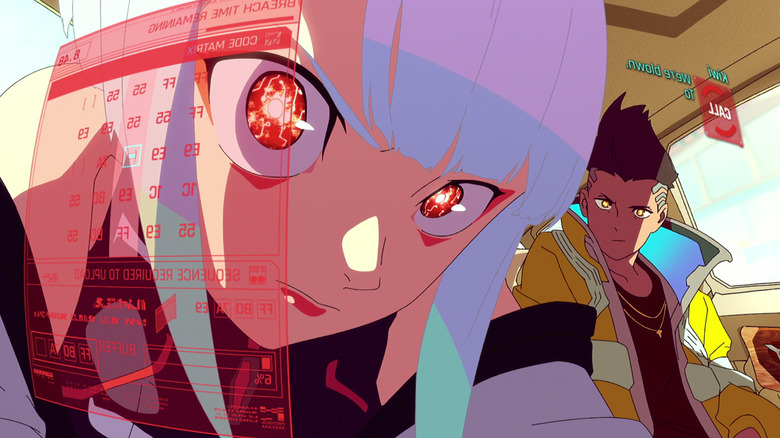Cyberpunk: Edgerunners Is More Than Just A Hyper-Violent Visual Marvel, It Lives Up To Its Genre Roots
(Welcome to Ani-time Ani-where, a regular column dedicated to helping the uninitiated understand and appreciate the world of anime.)
Despite what the creators of HBO's "The Last of Us" live-action show may tell you, there have already been excellent video game adaptations, but most of them are in animation. From "Castlevania," to "Arcane," animation has captured the unique and diverse worlds of popular gaming franchises and reinvented them with entertaining and profound stories. Last year, we got a new entry in the canon of video game adaptations that proves there is no such thing as a video game curse — "Cyberpunk: Edgerunners."
Based on one of the biggest video game failures in recent memory, there was a lot to be excited for and also worried about with "Edgerunners." The original "Cyberpunk 2077" was a highly-anticipated game, publicized based on the studio behind it and the inclusion of Keanu Reeves in its cast, but ended up a colossal mess ridden with bugs and other issues. But that's not "Cyberpunk: Edgerunners."
All it took to fulfill the promise of the "Cyberpunk" world was for CD Projekt RED to partner with one of the most exciting anime studios working today, and one of the best creative teams in the industry, give them years of pre-production and lots of creative liberty. The result is one of the best anime of 2022, one that greatly expands on and redeems its source material, but also stands out as a great cyberpunk story that uses the genre for more than pretty aesthetics.
We follow David Martinez, a poor and destitute young man who, after the tragic death of his mother, joins a group of mercenaries with cybernetic enhancements known as edgerunners. From there, the show becomes an emotionally damaging, but also a hyper-violent story of love and class warfare.
What makes it great
Let's get something out of the way first. Yes, "Cyberpunk: Edgerunners" is a beautiful-looking show, but that's par for the course with Studio Trigger. Even before the studio was formed, shows like "Gurren Lagann" had a unique and distinct visual style that was unlike anything else in anime, and the creative team hasn't stopped. The bright colors, immediately recognizable character designs, silhouettes, and fluid animation all combine to deliver a fully fleshed-out world and a world that feels real and tactile.
Hence, the first thing that makes this show special. From the very first episode, the world of Night City feels lived-in, like it existed before the show began, and expands beyond what the characters live through. From the neon lights that cover the hundreds of skyscrapers, to the seedy alleys and decadent establishments those without wealth and power go to, "Cyberpunk: Edgerunners" paints a picture of a world where money is everything, and where those who don't have it suffer in every conceivable way, but that also makes any human connection all the more special.
This makes the chemistry between the characters stand out even more, and this is a show with an incredible ensemble of characters. From David and his love interest Lucy, to his teammates like Maine, Dorio, Falco, and the breakout hit character, Rebecca, everyone in the show, no matter how small their role or arc, feels real. That's because Studio Trigger manages to design the hell out of the characters to the point where the visuals tell you more about who they are as people than any piece of dialogue or side story could.
What it adds to the conversation
What truly makes "Cyberpunk: Edgerunners" stand out not only as a video game adaptation but as a cyberpunk anime, is how it lives up to the origin of the cyberpunk genre by delivering a rather poignant story of class warfare that also features a lot of gnarly and gory action.
From the moment we meet David, it becomes clear how much poverty impacts every aspect of his life. There are simple things like a washing machine breaking and depriving him of a school uniform, but also big ones like how his mother is left on the side of a road by EMTs because she doesn't have insurance, or how David's insurance doesn't cover visitation rights when she finally makes it to the hospital.
The world of Night City is a cruel and unforgiving one, and within the first episode, it is hard not to side with David as he decides to get a stolen military-grade cybernetic enhancement and take to a life of crime rather than starve. Unlike the games, where you become an edgerunner because of fame and recognition, the characters of "Cyberpunk: Edgerunners" live day-by-day not knowing if it will be their last, and that impacts every decision they make.
Despite cybernetic enhancements featuring so prominently in the show, it thankfully avoids the tired sci-fi question of whether changing your body makes you less human. Instead, the show focuses on the toll these enhancements have on the human body. Everyone with enhancements risks developing "cyberpsychosis," essentially a mental illness brought by an overload of augmentations. This is completely absent in the games but gives each character in the anime a ticking time bomb in which they start losing themselves. It is heartbreaking and painful to watch, but it is also brilliant.
Why non-anime fans should check it out
"Cyberpunk: Edgerunners" delivers on the promise of anime in the streaming era, of companies around the world collaborating to deliver unique shows that wouldn't have been possible even just a handful of years ago. This show sees one of the best creative teams in the anime industry working with one of the most renowned gaming studios working today, delivering a video game adaptation that feels not like a cash-in, and not even as an extension of the game, but as a reimagining of the core concept of "Cyberpunk 2077."
The result is a show that, like "Akudama Drive," reminds us of the radical thematic resonance of the cyberpunk genre as well as its ability to deliver very cool worlds — and in this case, a hyper-violent one. The first episode draws you in with dazzling visuals, gnarly violence, and an opening by Franz Ferdinand, but by the time the credits roll on the last episode and Rosa Walton's "I Really Want To Stay At Your House" plays for the last time, "Cyberpunk: Edgerunners" leaves you with the sensation you have just witnessed a truly special work of animation.
Watch this if you like: "Akudama Drive," "Cyber City Oedo 808," and "Akira."
"Cyberpunk: Edgerunners" is streaming on Netflix.



